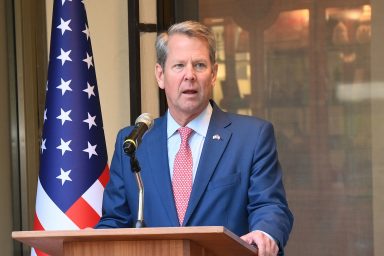Georgia’s first female African American gubernatorial nominee ran a radically progressive campaign that should have been anathema to voters in a deep-red state. Instead, she may have provided a blueprint for her party to win in the South.
In Georgia, a state long considered a GOP firewall, inspired minority voters fired the opening salvo of a Democratic resurgence on Tuesday, delivering Stacey Abrams the party’s nomination for governor.
Abrams, the former minority leader of the Georgia General Assembly, swatted aside her primary opponent by a 3–1 margin to become the state’s first female African American gubernatorial nominee.
The feat is even more impressive considering the issues she championed. While Democrats in the South typically lean centrist and skirt polarizing subjects, Abrams ran on a consistent progressive platform that included anti-discrimination laws, economic mobility programs, and a spate of children’s initiatives (affordable childcare, universal pre-K, access to higher education).
Her triumph shows that the time may have come for the party to rethink its Southern strategy. The moderate, biracial coalition that Southern Democrats spent decades building has yielded little success in higher office. Prominent centrist African American Democrats in the South, from Charlotte Mayor Harvey Gantt to Dallas Mayor Ron Kirk, breezed through primaries in their bids to become US senators, only to be trounced by staunch GOP conservatives in general elections.
“Democrats can’t win by pretending to be Republicans,” Abrams told PBS the morning after her historic win. By pushing an unabashedly progressive agenda, she mobilized not just ballot-averse minority voters but also white Democrats and independents.
New York Times columnist Sean McElwee attributed Abrams’s primary success to the shifting racial attitude of white liberals, who have grown markedly more sympathetic toward the struggles of those living on the fringe. Racial inequality and injustice, an ever-present reality in American society, has triggered widespread protests and moved toward center stage in national politics.
Whereas the party’s former torchbearers, Barack Obama and Hillary Clinton, touted compromise to bridge racial divides, Abrams and the new wave of liberals consider such a centrist mindset too passive.
Rather than seeking to understand the other side — those who oppress minority rights through legislation, rhetoric, or violence — they prefer to address systemic discrimination directly by opposing any candidate who falls short of a “stringent standard on racial equity.”
The optimism and energy that Abrams’s victory has inspired is well-earned, but to repeat this feat in the general election will be a tall order. Georgia has not elected a Democratic governor in 20 years, and has not had an African American governor since Reconstruction.
Watch the videos below for Abrams’s full interview with PBS, and to see how African Americans reacted to her victory.
Related front page panorama photo credit: Adapted by WhoWhatWhy from Stacey Abrams (LBJ School / Flickr – CC BY-SA 2.0).



